Organisational Behaviour Report: Impact of Culture, Power at TESCO
VerifiedAdded on 2020/07/23
|18
|5721
|54
Report
AI Summary
This report provides an analysis of organisational behaviour, focusing on the case of TESCO. It delves into how organisational culture, power, and politics influence individual and team behaviour. The report explores Charles Handy's model of organisational culture, examining power, role, task, and personal cultures. It then examines various motivation theories, including Maslow's Hierarchy of Needs and Herzberg's Two-Factor Theory, and their application in achieving business goals. Furthermore, the report discusses effective versus ineffective teams and the application of organisational behaviour concepts and philosophies in business situations, offering insights into how these elements impact TESCO's operations and employee dynamics.
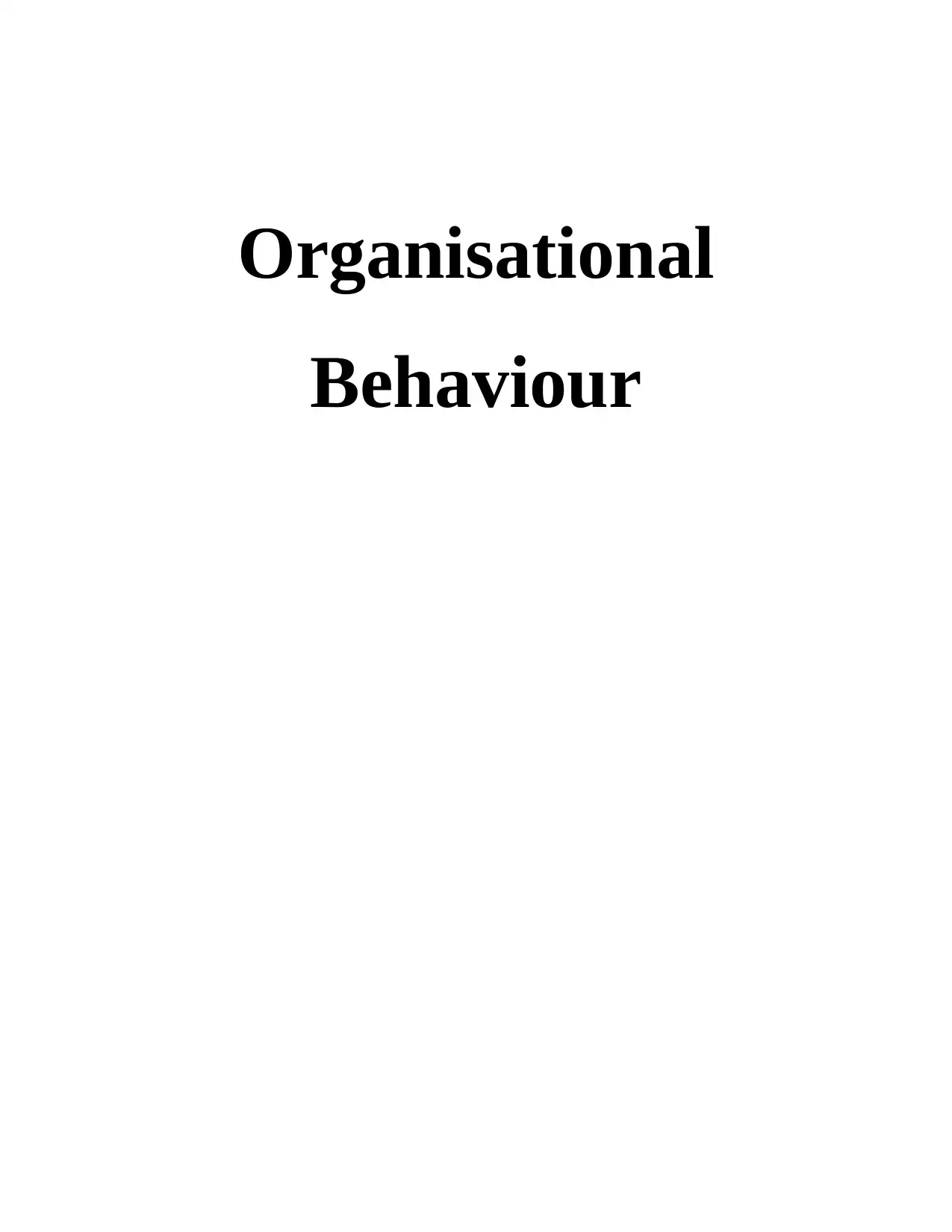
Organisational
Behaviour
Behaviour
Paraphrase This Document
Need a fresh take? Get an instant paraphrase of this document with our AI Paraphraser
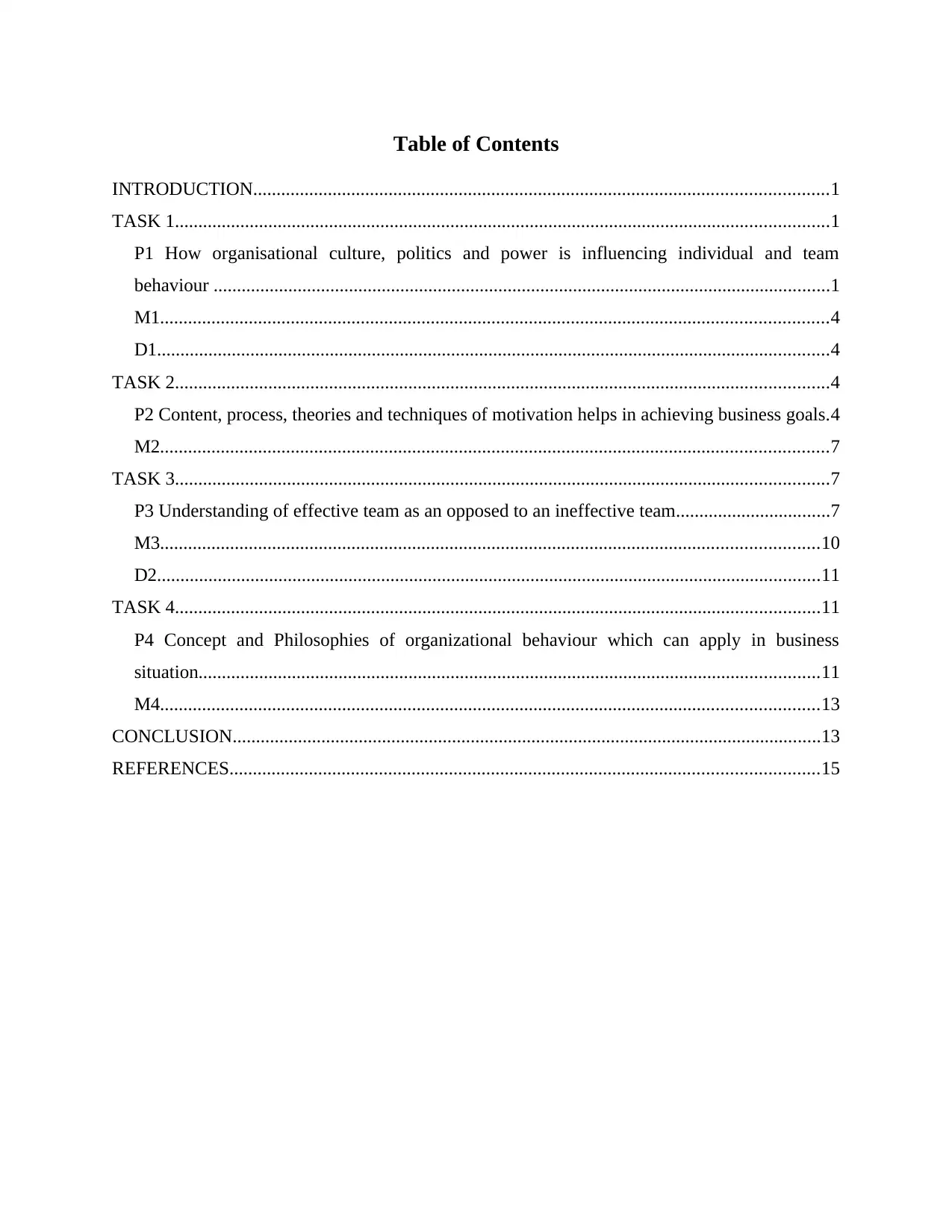
Table of Contents
INTRODUCTION...........................................................................................................................1
TASK 1............................................................................................................................................1
P1 How organisational culture, politics and power is influencing individual and team
behaviour ....................................................................................................................................1
M1...............................................................................................................................................4
D1................................................................................................................................................4
TASK 2............................................................................................................................................4
P2 Content, process, theories and techniques of motivation helps in achieving business goals.4
M2...............................................................................................................................................7
TASK 3............................................................................................................................................7
P3 Understanding of effective team as an opposed to an ineffective team.................................7
M3.............................................................................................................................................10
D2..............................................................................................................................................11
TASK 4..........................................................................................................................................11
P4 Concept and Philosophies of organizational behaviour which can apply in business
situation.....................................................................................................................................11
M4.............................................................................................................................................13
CONCLUSION..............................................................................................................................13
REFERENCES..............................................................................................................................15
INTRODUCTION...........................................................................................................................1
TASK 1............................................................................................................................................1
P1 How organisational culture, politics and power is influencing individual and team
behaviour ....................................................................................................................................1
M1...............................................................................................................................................4
D1................................................................................................................................................4
TASK 2............................................................................................................................................4
P2 Content, process, theories and techniques of motivation helps in achieving business goals.4
M2...............................................................................................................................................7
TASK 3............................................................................................................................................7
P3 Understanding of effective team as an opposed to an ineffective team.................................7
M3.............................................................................................................................................10
D2..............................................................................................................................................11
TASK 4..........................................................................................................................................11
P4 Concept and Philosophies of organizational behaviour which can apply in business
situation.....................................................................................................................................11
M4.............................................................................................................................................13
CONCLUSION..............................................................................................................................13
REFERENCES..............................................................................................................................15
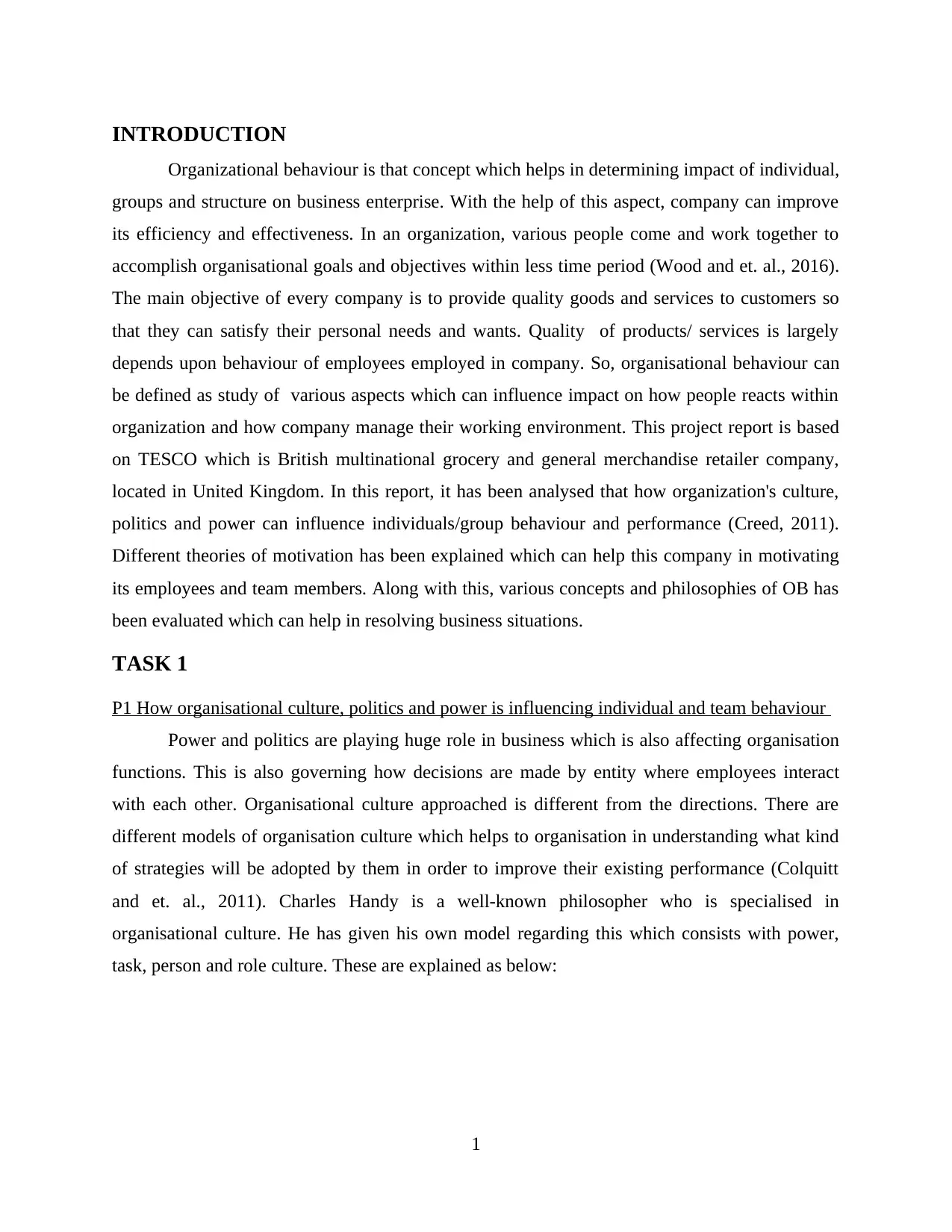
INTRODUCTION
Organizational behaviour is that concept which helps in determining impact of individual,
groups and structure on business enterprise. With the help of this aspect, company can improve
its efficiency and effectiveness. In an organization, various people come and work together to
accomplish organisational goals and objectives within less time period (Wood and et. al., 2016).
The main objective of every company is to provide quality goods and services to customers so
that they can satisfy their personal needs and wants. Quality of products/ services is largely
depends upon behaviour of employees employed in company. So, organisational behaviour can
be defined as study of various aspects which can influence impact on how people reacts within
organization and how company manage their working environment. This project report is based
on TESCO which is British multinational grocery and general merchandise retailer company,
located in United Kingdom. In this report, it has been analysed that how organization's culture,
politics and power can influence individuals/group behaviour and performance (Creed, 2011).
Different theories of motivation has been explained which can help this company in motivating
its employees and team members. Along with this, various concepts and philosophies of OB has
been evaluated which can help in resolving business situations.
TASK 1
P1 How organisational culture, politics and power is influencing individual and team behaviour
Power and politics are playing huge role in business which is also affecting organisation
functions. This is also governing how decisions are made by entity where employees interact
with each other. Organisational culture approached is different from the directions. There are
different models of organisation culture which helps to organisation in understanding what kind
of strategies will be adopted by them in order to improve their existing performance (Colquitt
and et. al., 2011). Charles Handy is a well-known philosopher who is specialised in
organisational culture. He has given his own model regarding this which consists with power,
task, person and role culture. These are explained as below:
1
Organizational behaviour is that concept which helps in determining impact of individual,
groups and structure on business enterprise. With the help of this aspect, company can improve
its efficiency and effectiveness. In an organization, various people come and work together to
accomplish organisational goals and objectives within less time period (Wood and et. al., 2016).
The main objective of every company is to provide quality goods and services to customers so
that they can satisfy their personal needs and wants. Quality of products/ services is largely
depends upon behaviour of employees employed in company. So, organisational behaviour can
be defined as study of various aspects which can influence impact on how people reacts within
organization and how company manage their working environment. This project report is based
on TESCO which is British multinational grocery and general merchandise retailer company,
located in United Kingdom. In this report, it has been analysed that how organization's culture,
politics and power can influence individuals/group behaviour and performance (Creed, 2011).
Different theories of motivation has been explained which can help this company in motivating
its employees and team members. Along with this, various concepts and philosophies of OB has
been evaluated which can help in resolving business situations.
TASK 1
P1 How organisational culture, politics and power is influencing individual and team behaviour
Power and politics are playing huge role in business which is also affecting organisation
functions. This is also governing how decisions are made by entity where employees interact
with each other. Organisational culture approached is different from the directions. There are
different models of organisation culture which helps to organisation in understanding what kind
of strategies will be adopted by them in order to improve their existing performance (Colquitt
and et. al., 2011). Charles Handy is a well-known philosopher who is specialised in
organisational culture. He has given his own model regarding this which consists with power,
task, person and role culture. These are explained as below:
1
⊘ This is a preview!⊘
Do you want full access?
Subscribe today to unlock all pages.

Trusted by 1+ million students worldwide
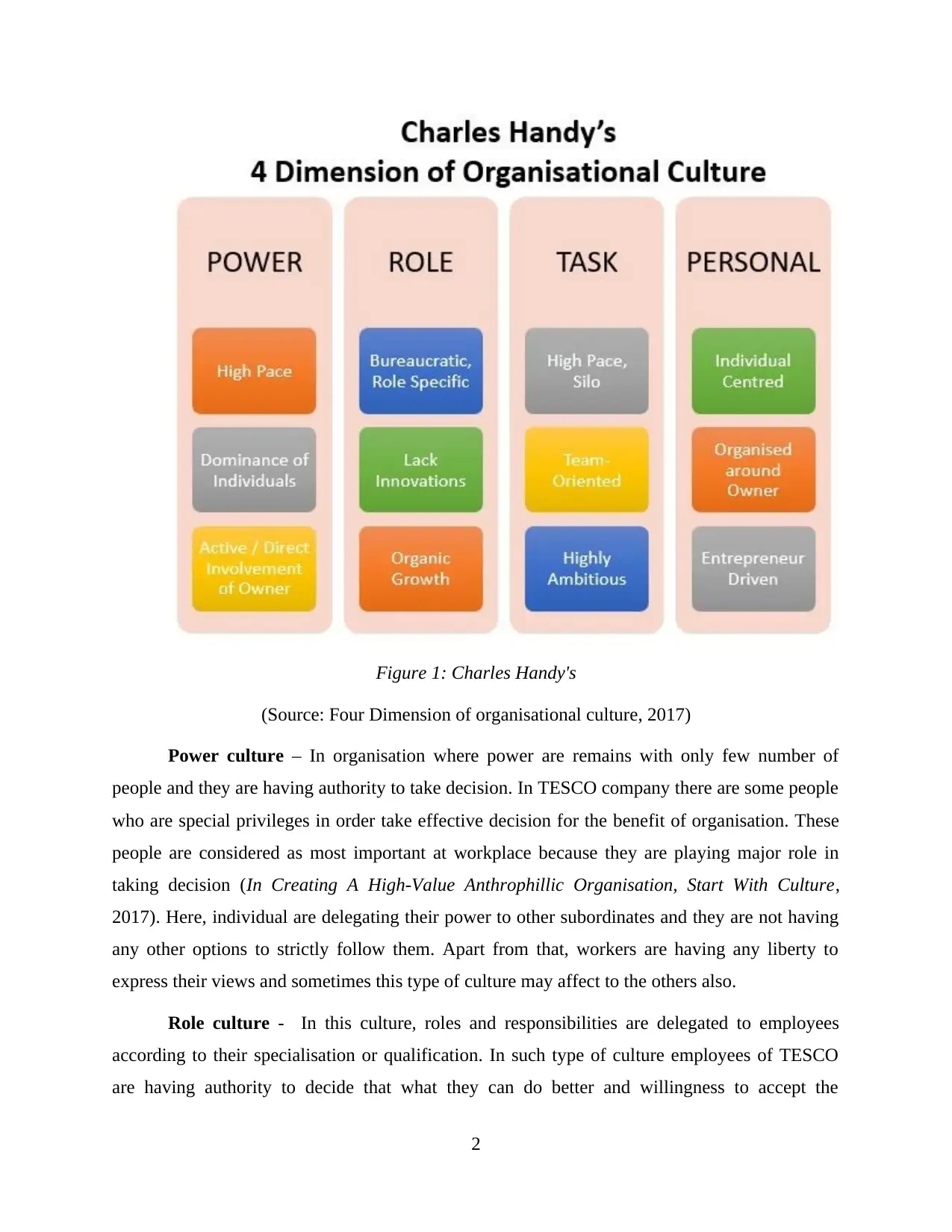
Figure 1: Charles Handy's
(Source: Four Dimension of organisational culture, 2017)
Power culture – In organisation where power are remains with only few number of
people and they are having authority to take decision. In TESCO company there are some people
who are special privileges in order take effective decision for the benefit of organisation. These
people are considered as most important at workplace because they are playing major role in
taking decision (In Creating A High-Value Anthrophillic Organisation, Start With Culture,
2017). Here, individual are delegating their power to other subordinates and they are not having
any other options to strictly follow them. Apart from that, workers are having any liberty to
express their views and sometimes this type of culture may affect to the others also.
Role culture - In this culture, roles and responsibilities are delegated to employees
according to their specialisation or qualification. In such type of culture employees of TESCO
are having authority to decide that what they can do better and willingness to accept the
2
(Source: Four Dimension of organisational culture, 2017)
Power culture – In organisation where power are remains with only few number of
people and they are having authority to take decision. In TESCO company there are some people
who are special privileges in order take effective decision for the benefit of organisation. These
people are considered as most important at workplace because they are playing major role in
taking decision (In Creating A High-Value Anthrophillic Organisation, Start With Culture,
2017). Here, individual are delegating their power to other subordinates and they are not having
any other options to strictly follow them. Apart from that, workers are having any liberty to
express their views and sometimes this type of culture may affect to the others also.
Role culture - In this culture, roles and responsibilities are delegated to employees
according to their specialisation or qualification. In such type of culture employees of TESCO
are having authority to decide that what they can do better and willingness to accept the
2
Paraphrase This Document
Need a fresh take? Get an instant paraphrase of this document with our AI Paraphraser
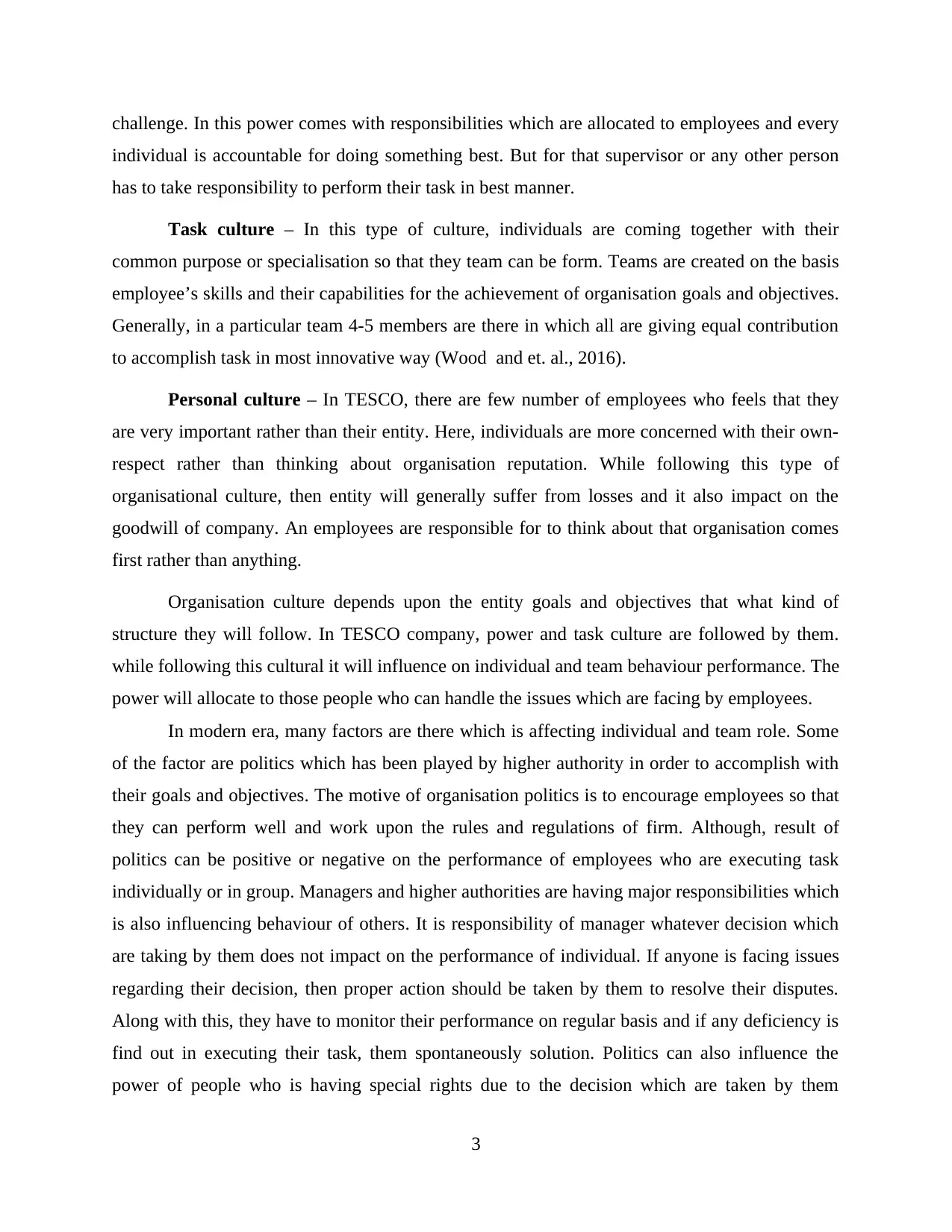
challenge. In this power comes with responsibilities which are allocated to employees and every
individual is accountable for doing something best. But for that supervisor or any other person
has to take responsibility to perform their task in best manner.
Task culture – In this type of culture, individuals are coming together with their
common purpose or specialisation so that they team can be form. Teams are created on the basis
employee’s skills and their capabilities for the achievement of organisation goals and objectives.
Generally, in a particular team 4-5 members are there in which all are giving equal contribution
to accomplish task in most innovative way (Wood and et. al., 2016).
Personal culture – In TESCO, there are few number of employees who feels that they
are very important rather than their entity. Here, individuals are more concerned with their own-
respect rather than thinking about organisation reputation. While following this type of
organisational culture, then entity will generally suffer from losses and it also impact on the
goodwill of company. An employees are responsible for to think about that organisation comes
first rather than anything.
Organisation culture depends upon the entity goals and objectives that what kind of
structure they will follow. In TESCO company, power and task culture are followed by them.
while following this cultural it will influence on individual and team behaviour performance. The
power will allocate to those people who can handle the issues which are facing by employees.
In modern era, many factors are there which is affecting individual and team role. Some
of the factor are politics which has been played by higher authority in order to accomplish with
their goals and objectives. The motive of organisation politics is to encourage employees so that
they can perform well and work upon the rules and regulations of firm. Although, result of
politics can be positive or negative on the performance of employees who are executing task
individually or in group. Managers and higher authorities are having major responsibilities which
is also influencing behaviour of others. It is responsibility of manager whatever decision which
are taking by them does not impact on the performance of individual. If anyone is facing issues
regarding their decision, then proper action should be taken by them to resolve their disputes.
Along with this, they have to monitor their performance on regular basis and if any deficiency is
find out in executing their task, them spontaneously solution. Politics can also influence the
power of people who is having special rights due to the decision which are taken by them
3
individual is accountable for doing something best. But for that supervisor or any other person
has to take responsibility to perform their task in best manner.
Task culture – In this type of culture, individuals are coming together with their
common purpose or specialisation so that they team can be form. Teams are created on the basis
employee’s skills and their capabilities for the achievement of organisation goals and objectives.
Generally, in a particular team 4-5 members are there in which all are giving equal contribution
to accomplish task in most innovative way (Wood and et. al., 2016).
Personal culture – In TESCO, there are few number of employees who feels that they
are very important rather than their entity. Here, individuals are more concerned with their own-
respect rather than thinking about organisation reputation. While following this type of
organisational culture, then entity will generally suffer from losses and it also impact on the
goodwill of company. An employees are responsible for to think about that organisation comes
first rather than anything.
Organisation culture depends upon the entity goals and objectives that what kind of
structure they will follow. In TESCO company, power and task culture are followed by them.
while following this cultural it will influence on individual and team behaviour performance. The
power will allocate to those people who can handle the issues which are facing by employees.
In modern era, many factors are there which is affecting individual and team role. Some
of the factor are politics which has been played by higher authority in order to accomplish with
their goals and objectives. The motive of organisation politics is to encourage employees so that
they can perform well and work upon the rules and regulations of firm. Although, result of
politics can be positive or negative on the performance of employees who are executing task
individually or in group. Managers and higher authorities are having major responsibilities which
is also influencing behaviour of others. It is responsibility of manager whatever decision which
are taking by them does not impact on the performance of individual. If anyone is facing issues
regarding their decision, then proper action should be taken by them to resolve their disputes.
Along with this, they have to monitor their performance on regular basis and if any deficiency is
find out in executing their task, them spontaneously solution. Politics can also influence the
power of people who is having special rights due to the decision which are taken by them
3
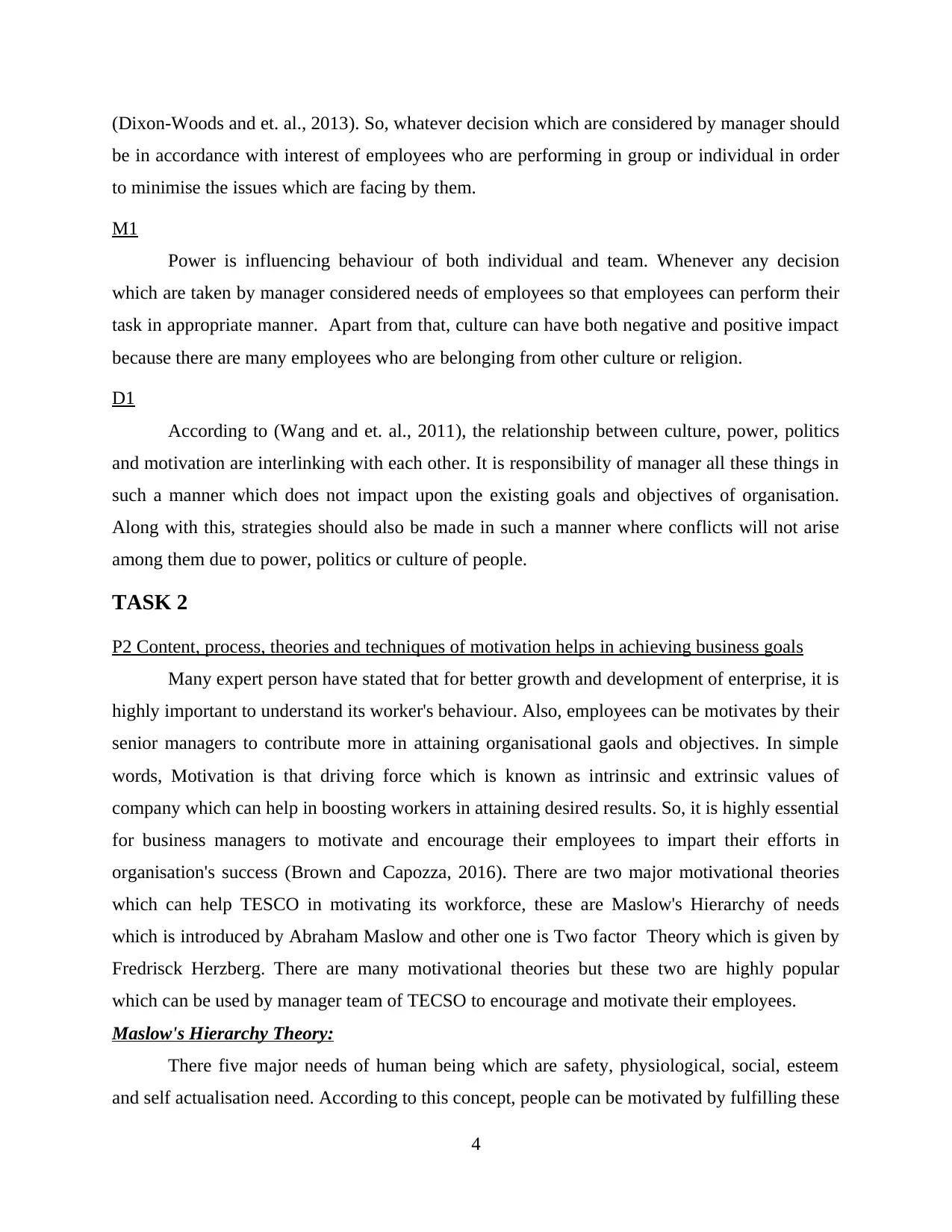
(Dixon-Woods and et. al., 2013). So, whatever decision which are considered by manager should
be in accordance with interest of employees who are performing in group or individual in order
to minimise the issues which are facing by them.
M1
Power is influencing behaviour of both individual and team. Whenever any decision
which are taken by manager considered needs of employees so that employees can perform their
task in appropriate manner. Apart from that, culture can have both negative and positive impact
because there are many employees who are belonging from other culture or religion.
D1
According to (Wang and et. al., 2011), the relationship between culture, power, politics
and motivation are interlinking with each other. It is responsibility of manager all these things in
such a manner which does not impact upon the existing goals and objectives of organisation.
Along with this, strategies should also be made in such a manner where conflicts will not arise
among them due to power, politics or culture of people.
TASK 2
P2 Content, process, theories and techniques of motivation helps in achieving business goals
Many expert person have stated that for better growth and development of enterprise, it is
highly important to understand its worker's behaviour. Also, employees can be motivates by their
senior managers to contribute more in attaining organisational gaols and objectives. In simple
words, Motivation is that driving force which is known as intrinsic and extrinsic values of
company which can help in boosting workers in attaining desired results. So, it is highly essential
for business managers to motivate and encourage their employees to impart their efforts in
organisation's success (Brown and Capozza, 2016). There are two major motivational theories
which can help TESCO in motivating its workforce, these are Maslow's Hierarchy of needs
which is introduced by Abraham Maslow and other one is Two factor Theory which is given by
Fredrisck Herzberg. There are many motivational theories but these two are highly popular
which can be used by manager team of TECSO to encourage and motivate their employees.
Maslow's Hierarchy Theory:
There five major needs of human being which are safety, physiological, social, esteem
and self actualisation need. According to this concept, people can be motivated by fulfilling these
4
be in accordance with interest of employees who are performing in group or individual in order
to minimise the issues which are facing by them.
M1
Power is influencing behaviour of both individual and team. Whenever any decision
which are taken by manager considered needs of employees so that employees can perform their
task in appropriate manner. Apart from that, culture can have both negative and positive impact
because there are many employees who are belonging from other culture or religion.
D1
According to (Wang and et. al., 2011), the relationship between culture, power, politics
and motivation are interlinking with each other. It is responsibility of manager all these things in
such a manner which does not impact upon the existing goals and objectives of organisation.
Along with this, strategies should also be made in such a manner where conflicts will not arise
among them due to power, politics or culture of people.
TASK 2
P2 Content, process, theories and techniques of motivation helps in achieving business goals
Many expert person have stated that for better growth and development of enterprise, it is
highly important to understand its worker's behaviour. Also, employees can be motivates by their
senior managers to contribute more in attaining organisational gaols and objectives. In simple
words, Motivation is that driving force which is known as intrinsic and extrinsic values of
company which can help in boosting workers in attaining desired results. So, it is highly essential
for business managers to motivate and encourage their employees to impart their efforts in
organisation's success (Brown and Capozza, 2016). There are two major motivational theories
which can help TESCO in motivating its workforce, these are Maslow's Hierarchy of needs
which is introduced by Abraham Maslow and other one is Two factor Theory which is given by
Fredrisck Herzberg. There are many motivational theories but these two are highly popular
which can be used by manager team of TECSO to encourage and motivate their employees.
Maslow's Hierarchy Theory:
There five major needs of human being which are safety, physiological, social, esteem
and self actualisation need. According to this concept, people can be motivated by fulfilling these
4
⊘ This is a preview!⊘
Do you want full access?
Subscribe today to unlock all pages.

Trusted by 1+ million students worldwide
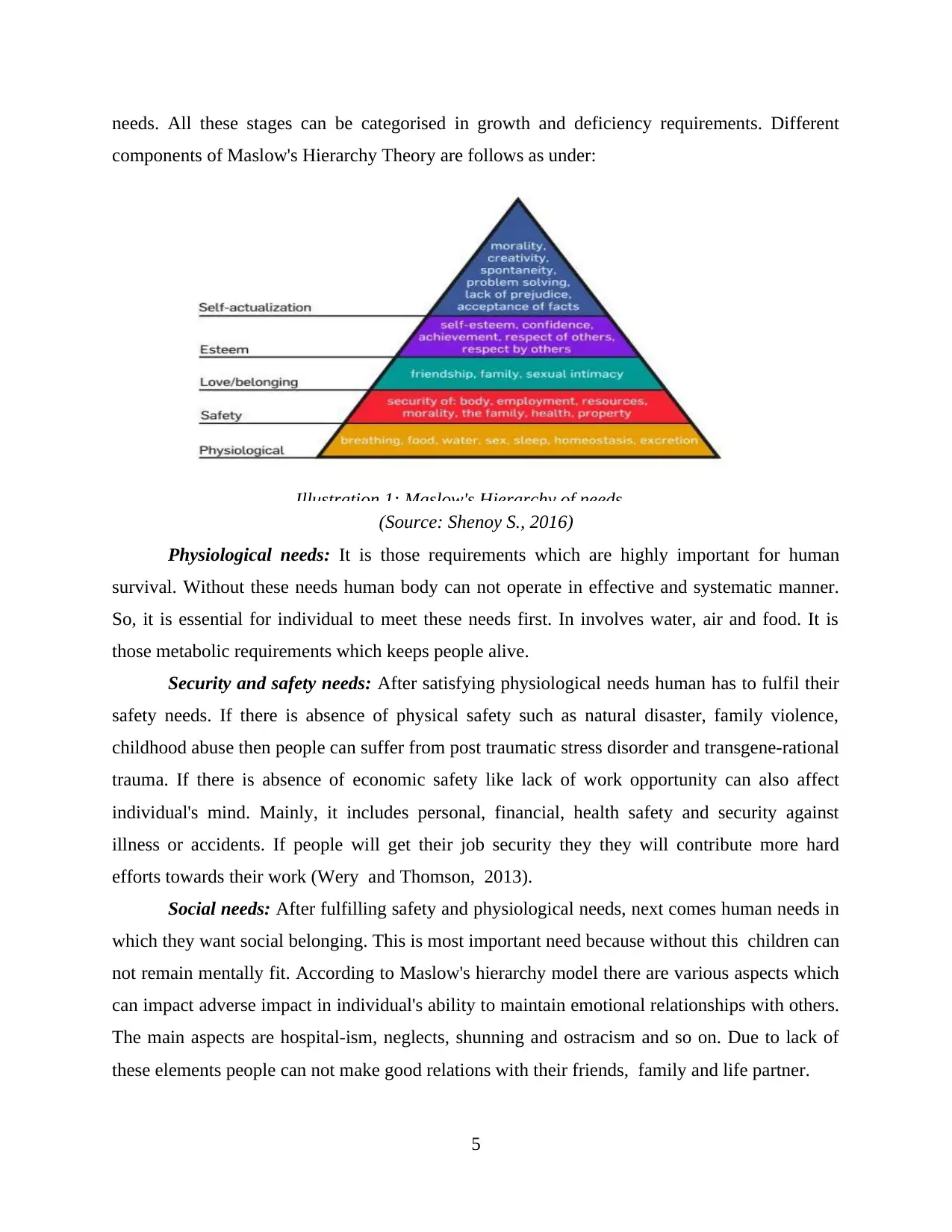
needs. All these stages can be categorised in growth and deficiency requirements. Different
components of Maslow's Hierarchy Theory are follows as under:
Illustration 1: Maslow's Hierarchy of needs
(Source: Shenoy S., 2016)
Physiological needs: It is those requirements which are highly important for human
survival. Without these needs human body can not operate in effective and systematic manner.
So, it is essential for individual to meet these needs first. In involves water, air and food. It is
those metabolic requirements which keeps people alive.
Security and safety needs: After satisfying physiological needs human has to fulfil their
safety needs. If there is absence of physical safety such as natural disaster, family violence,
childhood abuse then people can suffer from post traumatic stress disorder and transgene-rational
trauma. If there is absence of economic safety like lack of work opportunity can also affect
individual's mind. Mainly, it includes personal, financial, health safety and security against
illness or accidents. If people will get their job security they they will contribute more hard
efforts towards their work (Wery and Thomson, 2013).
Social needs: After fulfilling safety and physiological needs, next comes human needs in
which they want social belonging. This is most important need because without this children can
not remain mentally fit. According to Maslow's hierarchy model there are various aspects which
can impact adverse impact in individual's ability to maintain emotional relationships with others.
The main aspects are hospital-ism, neglects, shunning and ostracism and so on. Due to lack of
these elements people can not make good relations with their friends, family and life partner.
5
components of Maslow's Hierarchy Theory are follows as under:
Illustration 1: Maslow's Hierarchy of needs
(Source: Shenoy S., 2016)
Physiological needs: It is those requirements which are highly important for human
survival. Without these needs human body can not operate in effective and systematic manner.
So, it is essential for individual to meet these needs first. In involves water, air and food. It is
those metabolic requirements which keeps people alive.
Security and safety needs: After satisfying physiological needs human has to fulfil their
safety needs. If there is absence of physical safety such as natural disaster, family violence,
childhood abuse then people can suffer from post traumatic stress disorder and transgene-rational
trauma. If there is absence of economic safety like lack of work opportunity can also affect
individual's mind. Mainly, it includes personal, financial, health safety and security against
illness or accidents. If people will get their job security they they will contribute more hard
efforts towards their work (Wery and Thomson, 2013).
Social needs: After fulfilling safety and physiological needs, next comes human needs in
which they want social belonging. This is most important need because without this children can
not remain mentally fit. According to Maslow's hierarchy model there are various aspects which
can impact adverse impact in individual's ability to maintain emotional relationships with others.
The main aspects are hospital-ism, neglects, shunning and ostracism and so on. Due to lack of
these elements people can not make good relations with their friends, family and life partner.
5
Paraphrase This Document
Need a fresh take? Get an instant paraphrase of this document with our AI Paraphraser
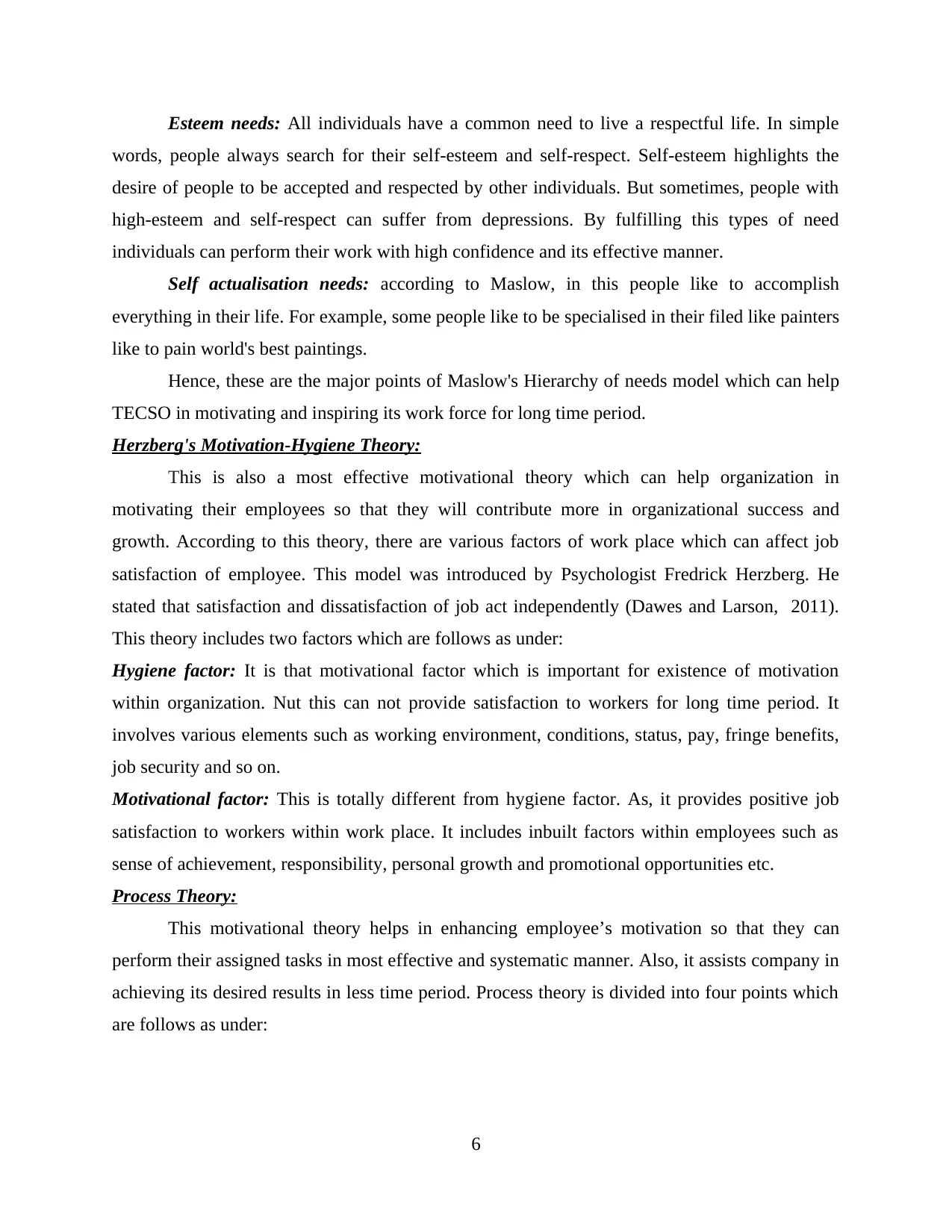
Esteem needs: All individuals have a common need to live a respectful life. In simple
words, people always search for their self-esteem and self-respect. Self-esteem highlights the
desire of people to be accepted and respected by other individuals. But sometimes, people with
high-esteem and self-respect can suffer from depressions. By fulfilling this types of need
individuals can perform their work with high confidence and its effective manner.
Self actualisation needs: according to Maslow, in this people like to accomplish
everything in their life. For example, some people like to be specialised in their filed like painters
like to pain world's best paintings.
Hence, these are the major points of Maslow's Hierarchy of needs model which can help
TECSO in motivating and inspiring its work force for long time period.
Herzberg's Motivation-Hygiene Theory:
This is also a most effective motivational theory which can help organization in
motivating their employees so that they will contribute more in organizational success and
growth. According to this theory, there are various factors of work place which can affect job
satisfaction of employee. This model was introduced by Psychologist Fredrick Herzberg. He
stated that satisfaction and dissatisfaction of job act independently (Dawes and Larson, 2011).
This theory includes two factors which are follows as under:
Hygiene factor: It is that motivational factor which is important for existence of motivation
within organization. Nut this can not provide satisfaction to workers for long time period. It
involves various elements such as working environment, conditions, status, pay, fringe benefits,
job security and so on.
Motivational factor: This is totally different from hygiene factor. As, it provides positive job
satisfaction to workers within work place. It includes inbuilt factors within employees such as
sense of achievement, responsibility, personal growth and promotional opportunities etc.
Process Theory:
This motivational theory helps in enhancing employee’s motivation so that they can
perform their assigned tasks in most effective and systematic manner. Also, it assists company in
achieving its desired results in less time period. Process theory is divided into four points which
are follows as under:
6
words, people always search for their self-esteem and self-respect. Self-esteem highlights the
desire of people to be accepted and respected by other individuals. But sometimes, people with
high-esteem and self-respect can suffer from depressions. By fulfilling this types of need
individuals can perform their work with high confidence and its effective manner.
Self actualisation needs: according to Maslow, in this people like to accomplish
everything in their life. For example, some people like to be specialised in their filed like painters
like to pain world's best paintings.
Hence, these are the major points of Maslow's Hierarchy of needs model which can help
TECSO in motivating and inspiring its work force for long time period.
Herzberg's Motivation-Hygiene Theory:
This is also a most effective motivational theory which can help organization in
motivating their employees so that they will contribute more in organizational success and
growth. According to this theory, there are various factors of work place which can affect job
satisfaction of employee. This model was introduced by Psychologist Fredrick Herzberg. He
stated that satisfaction and dissatisfaction of job act independently (Dawes and Larson, 2011).
This theory includes two factors which are follows as under:
Hygiene factor: It is that motivational factor which is important for existence of motivation
within organization. Nut this can not provide satisfaction to workers for long time period. It
involves various elements such as working environment, conditions, status, pay, fringe benefits,
job security and so on.
Motivational factor: This is totally different from hygiene factor. As, it provides positive job
satisfaction to workers within work place. It includes inbuilt factors within employees such as
sense of achievement, responsibility, personal growth and promotional opportunities etc.
Process Theory:
This motivational theory helps in enhancing employee’s motivation so that they can
perform their assigned tasks in most effective and systematic manner. Also, it assists company in
achieving its desired results in less time period. Process theory is divided into four points which
are follows as under:
6
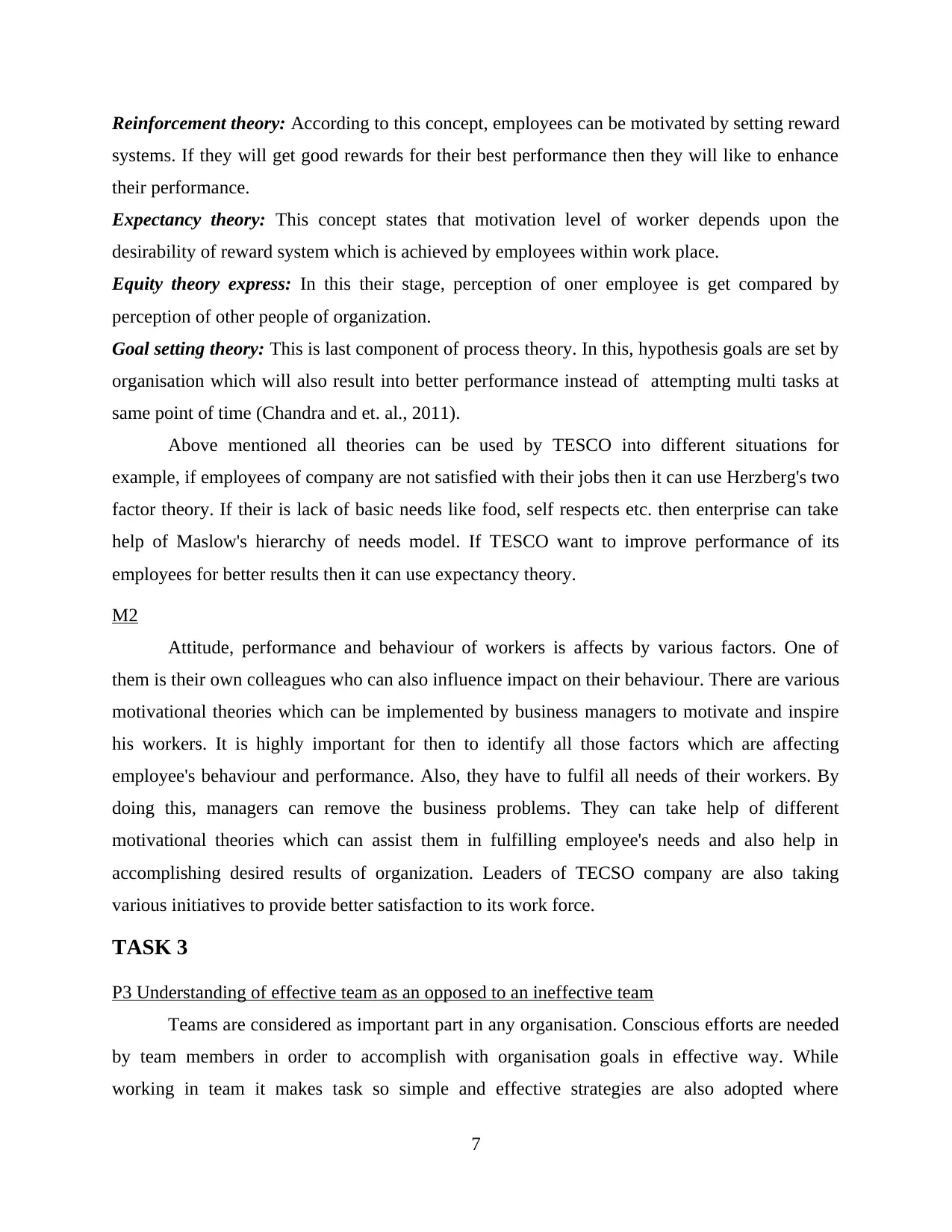
Reinforcement theory: According to this concept, employees can be motivated by setting reward
systems. If they will get good rewards for their best performance then they will like to enhance
their performance.
Expectancy theory: This concept states that motivation level of worker depends upon the
desirability of reward system which is achieved by employees within work place.
Equity theory express: In this their stage, perception of oner employee is get compared by
perception of other people of organization.
Goal setting theory: This is last component of process theory. In this, hypothesis goals are set by
organisation which will also result into better performance instead of attempting multi tasks at
same point of time (Chandra and et. al., 2011).
Above mentioned all theories can be used by TESCO into different situations for
example, if employees of company are not satisfied with their jobs then it can use Herzberg's two
factor theory. If their is lack of basic needs like food, self respects etc. then enterprise can take
help of Maslow's hierarchy of needs model. If TESCO want to improve performance of its
employees for better results then it can use expectancy theory.
M2
Attitude, performance and behaviour of workers is affects by various factors. One of
them is their own colleagues who can also influence impact on their behaviour. There are various
motivational theories which can be implemented by business managers to motivate and inspire
his workers. It is highly important for then to identify all those factors which are affecting
employee's behaviour and performance. Also, they have to fulfil all needs of their workers. By
doing this, managers can remove the business problems. They can take help of different
motivational theories which can assist them in fulfilling employee's needs and also help in
accomplishing desired results of organization. Leaders of TECSO company are also taking
various initiatives to provide better satisfaction to its work force.
TASK 3
P3 Understanding of effective team as an opposed to an ineffective team
Teams are considered as important part in any organisation. Conscious efforts are needed
by team members in order to accomplish with organisation goals in effective way. While
working in team it makes task so simple and effective strategies are also adopted where
7
systems. If they will get good rewards for their best performance then they will like to enhance
their performance.
Expectancy theory: This concept states that motivation level of worker depends upon the
desirability of reward system which is achieved by employees within work place.
Equity theory express: In this their stage, perception of oner employee is get compared by
perception of other people of organization.
Goal setting theory: This is last component of process theory. In this, hypothesis goals are set by
organisation which will also result into better performance instead of attempting multi tasks at
same point of time (Chandra and et. al., 2011).
Above mentioned all theories can be used by TESCO into different situations for
example, if employees of company are not satisfied with their jobs then it can use Herzberg's two
factor theory. If their is lack of basic needs like food, self respects etc. then enterprise can take
help of Maslow's hierarchy of needs model. If TESCO want to improve performance of its
employees for better results then it can use expectancy theory.
M2
Attitude, performance and behaviour of workers is affects by various factors. One of
them is their own colleagues who can also influence impact on their behaviour. There are various
motivational theories which can be implemented by business managers to motivate and inspire
his workers. It is highly important for then to identify all those factors which are affecting
employee's behaviour and performance. Also, they have to fulfil all needs of their workers. By
doing this, managers can remove the business problems. They can take help of different
motivational theories which can assist them in fulfilling employee's needs and also help in
accomplishing desired results of organization. Leaders of TECSO company are also taking
various initiatives to provide better satisfaction to its work force.
TASK 3
P3 Understanding of effective team as an opposed to an ineffective team
Teams are considered as important part in any organisation. Conscious efforts are needed
by team members in order to accomplish with organisation goals in effective way. While
working in team it makes task so simple and effective strategies are also adopted where
7
⊘ This is a preview!⊘
Do you want full access?
Subscribe today to unlock all pages.

Trusted by 1+ million students worldwide
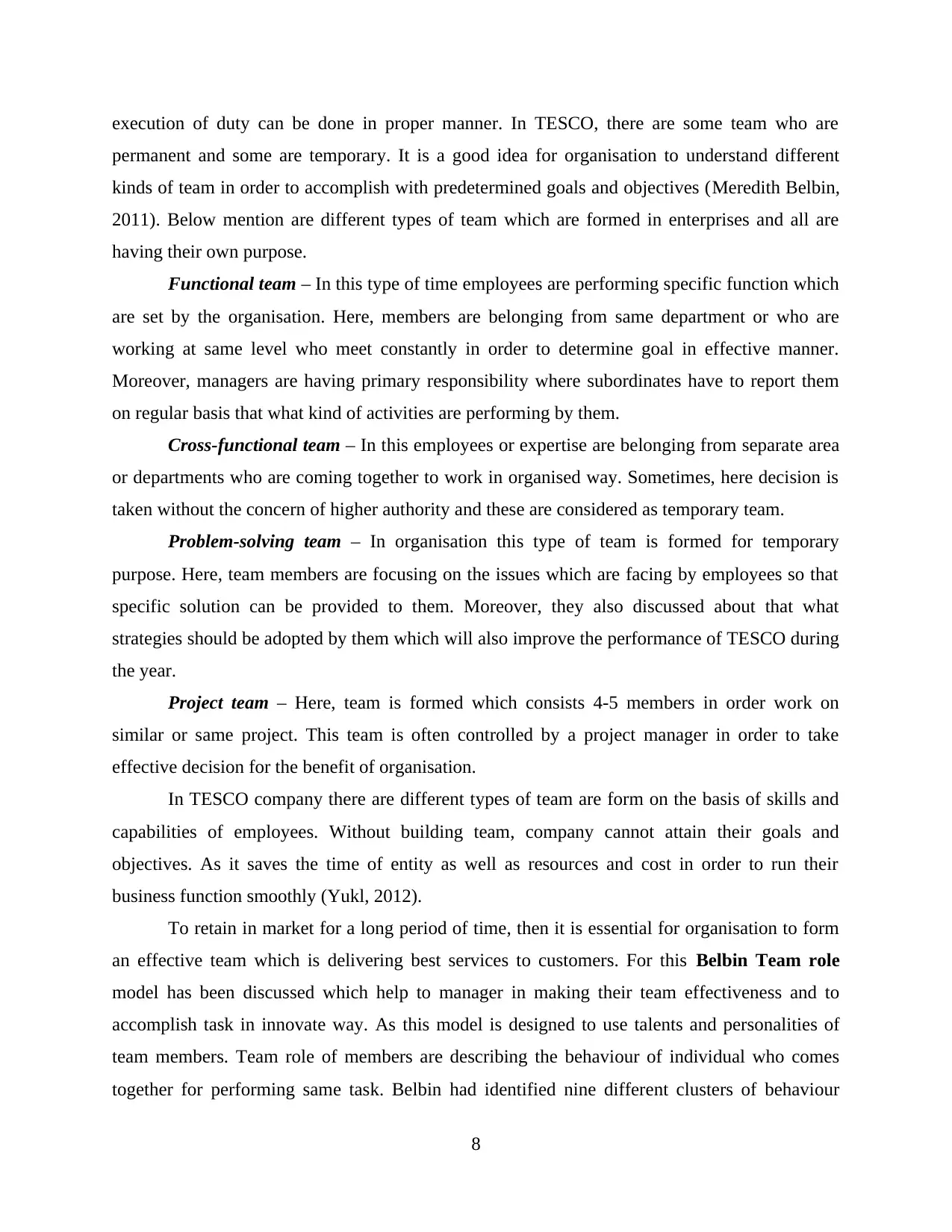
execution of duty can be done in proper manner. In TESCO, there are some team who are
permanent and some are temporary. It is a good idea for organisation to understand different
kinds of team in order to accomplish with predetermined goals and objectives (Meredith Belbin,
2011). Below mention are different types of team which are formed in enterprises and all are
having their own purpose.
Functional team – In this type of time employees are performing specific function which
are set by the organisation. Here, members are belonging from same department or who are
working at same level who meet constantly in order to determine goal in effective manner.
Moreover, managers are having primary responsibility where subordinates have to report them
on regular basis that what kind of activities are performing by them.
Cross-functional team – In this employees or expertise are belonging from separate area
or departments who are coming together to work in organised way. Sometimes, here decision is
taken without the concern of higher authority and these are considered as temporary team.
Problem-solving team – In organisation this type of team is formed for temporary
purpose. Here, team members are focusing on the issues which are facing by employees so that
specific solution can be provided to them. Moreover, they also discussed about that what
strategies should be adopted by them which will also improve the performance of TESCO during
the year.
Project team – Here, team is formed which consists 4-5 members in order work on
similar or same project. This team is often controlled by a project manager in order to take
effective decision for the benefit of organisation.
In TESCO company there are different types of team are form on the basis of skills and
capabilities of employees. Without building team, company cannot attain their goals and
objectives. As it saves the time of entity as well as resources and cost in order to run their
business function smoothly (Yukl, 2012).
To retain in market for a long period of time, then it is essential for organisation to form
an effective team which is delivering best services to customers. For this Belbin Team role
model has been discussed which help to manager in making their team effectiveness and to
accomplish task in innovate way. As this model is designed to use talents and personalities of
team members. Team role of members are describing the behaviour of individual who comes
together for performing same task. Belbin had identified nine different clusters of behaviour
8
permanent and some are temporary. It is a good idea for organisation to understand different
kinds of team in order to accomplish with predetermined goals and objectives (Meredith Belbin,
2011). Below mention are different types of team which are formed in enterprises and all are
having their own purpose.
Functional team – In this type of time employees are performing specific function which
are set by the organisation. Here, members are belonging from same department or who are
working at same level who meet constantly in order to determine goal in effective manner.
Moreover, managers are having primary responsibility where subordinates have to report them
on regular basis that what kind of activities are performing by them.
Cross-functional team – In this employees or expertise are belonging from separate area
or departments who are coming together to work in organised way. Sometimes, here decision is
taken without the concern of higher authority and these are considered as temporary team.
Problem-solving team – In organisation this type of team is formed for temporary
purpose. Here, team members are focusing on the issues which are facing by employees so that
specific solution can be provided to them. Moreover, they also discussed about that what
strategies should be adopted by them which will also improve the performance of TESCO during
the year.
Project team – Here, team is formed which consists 4-5 members in order work on
similar or same project. This team is often controlled by a project manager in order to take
effective decision for the benefit of organisation.
In TESCO company there are different types of team are form on the basis of skills and
capabilities of employees. Without building team, company cannot attain their goals and
objectives. As it saves the time of entity as well as resources and cost in order to run their
business function smoothly (Yukl, 2012).
To retain in market for a long period of time, then it is essential for organisation to form
an effective team which is delivering best services to customers. For this Belbin Team role
model has been discussed which help to manager in making their team effectiveness and to
accomplish task in innovate way. As this model is designed to use talents and personalities of
team members. Team role of members are describing the behaviour of individual who comes
together for performing same task. Belbin had identified nine different clusters of behaviour
8
Paraphrase This Document
Need a fresh take? Get an instant paraphrase of this document with our AI Paraphraser
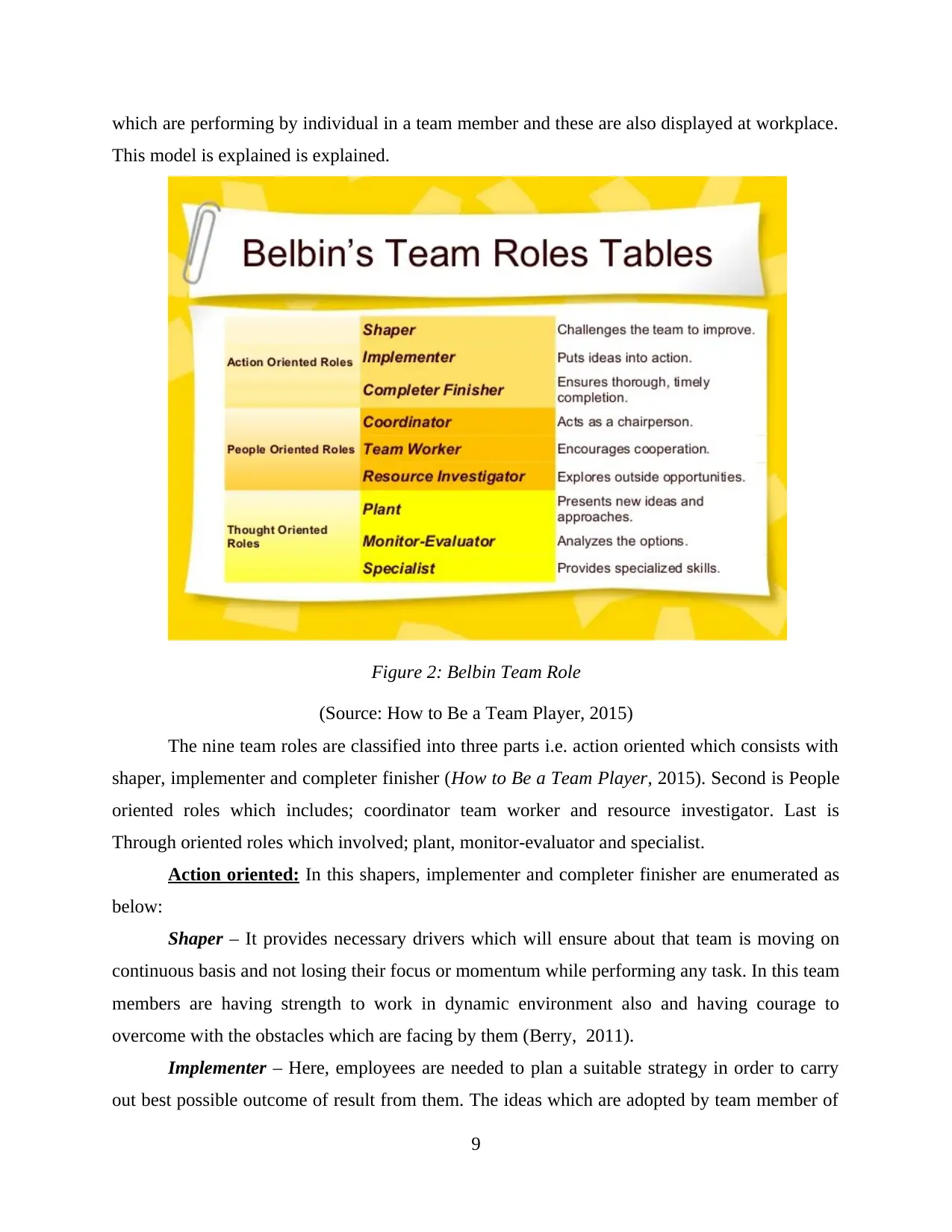
which are performing by individual in a team member and these are also displayed at workplace.
This model is explained is explained.
Figure 2: Belbin Team Role
(Source: How to Be a Team Player, 2015)
The nine team roles are classified into three parts i.e. action oriented which consists with
shaper, implementer and completer finisher (How to Be a Team Player, 2015). Second is People
oriented roles which includes; coordinator team worker and resource investigator. Last is
Through oriented roles which involved; plant, monitor-evaluator and specialist.
Action oriented: In this shapers, implementer and completer finisher are enumerated as
below:
Shaper – It provides necessary drivers which will ensure about that team is moving on
continuous basis and not losing their focus or momentum while performing any task. In this team
members are having strength to work in dynamic environment also and having courage to
overcome with the obstacles which are facing by them (Berry, 2011).
Implementer – Here, employees are needed to plan a suitable strategy in order to carry
out best possible outcome of result from them. The ideas which are adopted by team member of
9
This model is explained is explained.
Figure 2: Belbin Team Role
(Source: How to Be a Team Player, 2015)
The nine team roles are classified into three parts i.e. action oriented which consists with
shaper, implementer and completer finisher (How to Be a Team Player, 2015). Second is People
oriented roles which includes; coordinator team worker and resource investigator. Last is
Through oriented roles which involved; plant, monitor-evaluator and specialist.
Action oriented: In this shapers, implementer and completer finisher are enumerated as
below:
Shaper – It provides necessary drivers which will ensure about that team is moving on
continuous basis and not losing their focus or momentum while performing any task. In this team
members are having strength to work in dynamic environment also and having courage to
overcome with the obstacles which are facing by them (Berry, 2011).
Implementer – Here, employees are needed to plan a suitable strategy in order to carry
out best possible outcome of result from them. The ideas which are adopted by team member of
9
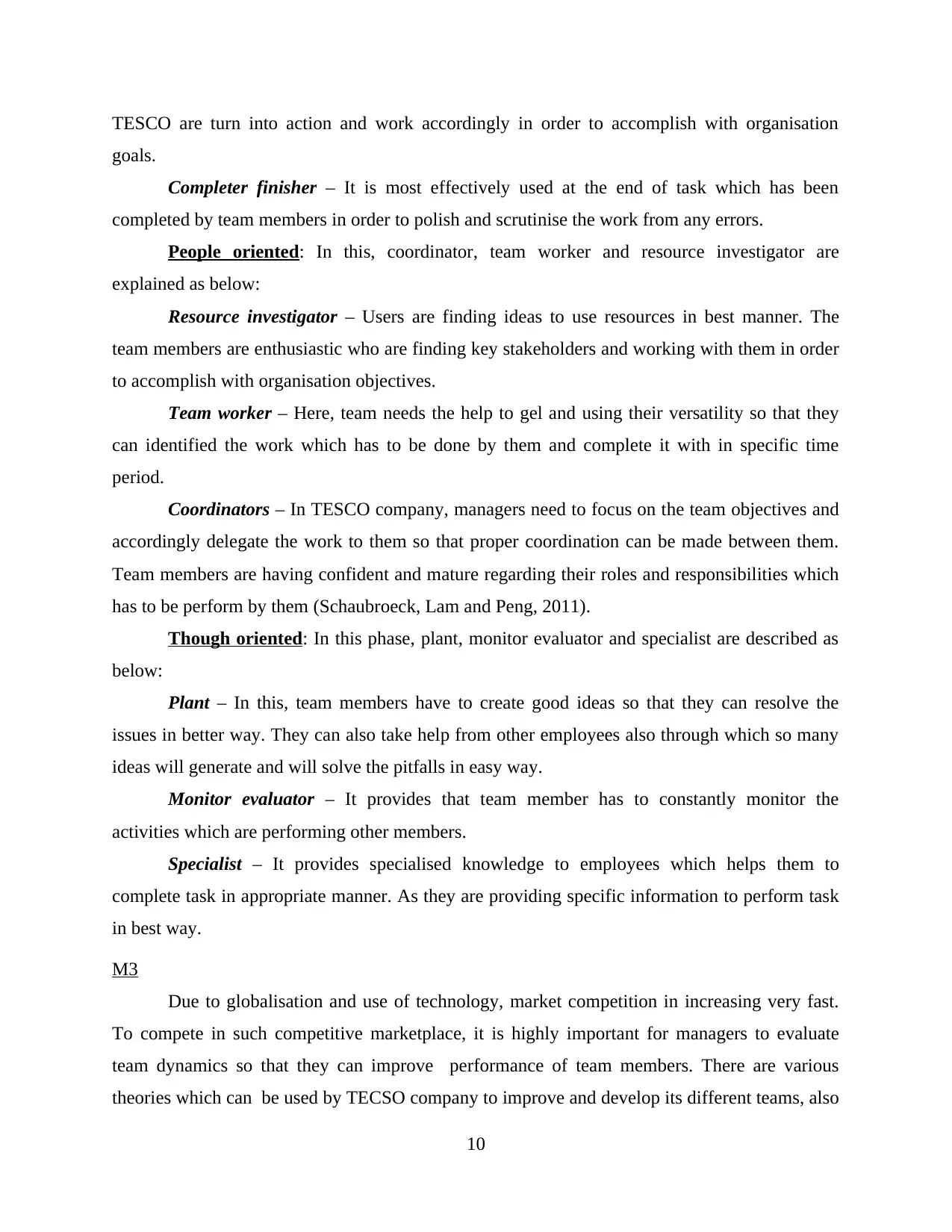
TESCO are turn into action and work accordingly in order to accomplish with organisation
goals.
Completer finisher – It is most effectively used at the end of task which has been
completed by team members in order to polish and scrutinise the work from any errors.
People oriented: In this, coordinator, team worker and resource investigator are
explained as below:
Resource investigator – Users are finding ideas to use resources in best manner. The
team members are enthusiastic who are finding key stakeholders and working with them in order
to accomplish with organisation objectives.
Team worker – Here, team needs the help to gel and using their versatility so that they
can identified the work which has to be done by them and complete it with in specific time
period.
Coordinators – In TESCO company, managers need to focus on the team objectives and
accordingly delegate the work to them so that proper coordination can be made between them.
Team members are having confident and mature regarding their roles and responsibilities which
has to be perform by them (Schaubroeck, Lam and Peng, 2011).
Though oriented: In this phase, plant, monitor evaluator and specialist are described as
below:
Plant – In this, team members have to create good ideas so that they can resolve the
issues in better way. They can also take help from other employees also through which so many
ideas will generate and will solve the pitfalls in easy way.
Monitor evaluator – It provides that team member has to constantly monitor the
activities which are performing other members.
Specialist – It provides specialised knowledge to employees which helps them to
complete task in appropriate manner. As they are providing specific information to perform task
in best way.
M3
Due to globalisation and use of technology, market competition in increasing very fast.
To compete in such competitive marketplace, it is highly important for managers to evaluate
team dynamics so that they can improve performance of team members. There are various
theories which can be used by TECSO company to improve and develop its different teams, also
10
goals.
Completer finisher – It is most effectively used at the end of task which has been
completed by team members in order to polish and scrutinise the work from any errors.
People oriented: In this, coordinator, team worker and resource investigator are
explained as below:
Resource investigator – Users are finding ideas to use resources in best manner. The
team members are enthusiastic who are finding key stakeholders and working with them in order
to accomplish with organisation objectives.
Team worker – Here, team needs the help to gel and using their versatility so that they
can identified the work which has to be done by them and complete it with in specific time
period.
Coordinators – In TESCO company, managers need to focus on the team objectives and
accordingly delegate the work to them so that proper coordination can be made between them.
Team members are having confident and mature regarding their roles and responsibilities which
has to be perform by them (Schaubroeck, Lam and Peng, 2011).
Though oriented: In this phase, plant, monitor evaluator and specialist are described as
below:
Plant – In this, team members have to create good ideas so that they can resolve the
issues in better way. They can also take help from other employees also through which so many
ideas will generate and will solve the pitfalls in easy way.
Monitor evaluator – It provides that team member has to constantly monitor the
activities which are performing other members.
Specialist – It provides specialised knowledge to employees which helps them to
complete task in appropriate manner. As they are providing specific information to perform task
in best way.
M3
Due to globalisation and use of technology, market competition in increasing very fast.
To compete in such competitive marketplace, it is highly important for managers to evaluate
team dynamics so that they can improve performance of team members. There are various
theories which can be used by TECSO company to improve and develop its different teams, also
10
⊘ This is a preview!⊘
Do you want full access?
Subscribe today to unlock all pages.

Trusted by 1+ million students worldwide
1 out of 18
Related Documents
Your All-in-One AI-Powered Toolkit for Academic Success.
+13062052269
info@desklib.com
Available 24*7 on WhatsApp / Email
![[object Object]](/_next/static/media/star-bottom.7253800d.svg)
Unlock your academic potential
Copyright © 2020–2026 A2Z Services. All Rights Reserved. Developed and managed by ZUCOL.





